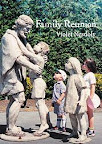Title: I Am the Poem Author: Alvin G. Ens
Publisher: Ensa Publishing, with Trafford - 2005
Genre: Poetry
ISBN: 1-4120-5886-4, perfect bound, 96 pages
When I heard that
I Am the Poem had won a
2006 Word Guild Award in the "Special Books" category, I was thrilled but not surprised. For this slim collection of poems and essays about poetry by Alvin Ens – a lifelong reader, teacher, and writer of poetry – is indeed a winner in more ways than one.
The book is divided into five main sections titled: "Reread," "Hear," "See," "Imagine," and "Communicate." A short manifesto-type essay heads each section with poems following.
In the prose pieces we see Ens the poetry teacher at work. He lays out for the reader in easy-to-understand language his vision and standard for good poetry. He explains how a good poem should reward the reader even after multiple readings. He maintains poems should be satisfying orally (even when they don’t rhyme) as well as intellectually. Further, he explains how they should paint images and symbols with a fresh brush (including the way the words are typeset on the page), should spark imagination, and should not be so abstruse as to mean something only to their writers.
In the poems that follow each essay Ens reflects, with humor, wisdom and cleverness, on personal and modern life.
Ens’s humor makes his poetry a lot of fun to read. Some of that humor emanates from his subject matter. "Discover the Cow" poses the whimsical suggestion that if brown cows give chocolate milk, black cows must give "licorice juice / and ugly like dandelion sauce." Another essential aspect of humor comes from his ability and willingness to laugh at himself:
"And most of all, golfing helps me learn
to keep my head down
when I swing
and especially when I’m asked
my score." >*
(from "Joys of Golf")
Personal poems with their wealth of wisdom about family relationships are sprinkled among the collection. I find these compelling even in their understatement. Who cannot hear the pathos in the first lines of "Rookie Card:"
"you are gone
like a traded hockey player
to reappear on the roster
of some other team... "
and "Commiserate":
"How do we take you
grown child
in our arms
on our laps
to kiss it better
to comfort..."
In "Owed to Irene" he sums up:
"I owe to Irene
in the free verse of life
a time of rhyme,
and in the paradox
of twenty-five years of two shall be one
the oxymoron
of the lasting moments of happiness.
In the conflicts of life
I her friend and she my peace."
Ode to Irene. Get it? That is vintage Ens – word-play all over the place! His cleverness with words is another characteristic of his poems. Here, for example, are a few lines that begin to dice the concept of postmodernism:
"the very age decries itself
painted into a lexicographer’s corner
as postmodernism
to follow modern
is to fall off the far side
of nothing...."
(from "Post Nonsense")
In another place he grapples with the idea of normal:
"... Normal is
intelligent
skillful
and pleasant;
abnormal
is below.
Normal
does not have
an above;
it is itself
above abnormal..."
(from "In Pursuit of Normal")
Concrete poetry is another specialty of his. Throughout the collection Ens does not shy away from playing with the look of words on a page – as explained in his essay "To Be Seen." His poem "The Vowel" is typeset in the shape of an E, "Treadmill" in an oval, and "Auditory Oddity" uses font variety – bold font, going to regular, then overstrike and finally gray scale till the words nearly disappear from the page – in a poem that tells about what it feels like to go deaf.
Though Ens’s Christian faith is not mentioned as overtly in these poems as in his first volume
Musings on the Sermon, its presence is still there in a foundational presupposition way, as hymn lyrics in "The Loop," and the mention of God in "Snow White," "Mud," "Cursed Is the Ground," "Of Parabolas and Parables," and several others.
If there is a fault, I would say it is in the way some of his poems, with their short lines, seem choppy and are challenging to read smoothly, packed as they are with tongue-twisty words:
"In this world of
supersonic jets
the ubiquity
of fiber optic messages
and the contemplation
of intergalactic commerce..."
(from "Scree")
But this tendency, noticed here and there amongst the abundance of fine poems, is an easy one to overlook. In fact it, along with Ens’s ability to elevate the most prosaic activities into poems (like taking a shower – "Rain Dance", watching slugs – "Slugs", getting the wrong change at a fast food restaurant – "Rip Off", and digging dandelions out of the lawn – "D Day") only helps us identify with him as a fellow mortal.
As a light-hearted collection of poems that is both accessible to the occasional reader of poetry and a pleasure to the afficionado,
I Am the Poem is definitely a winner in my books too.










































